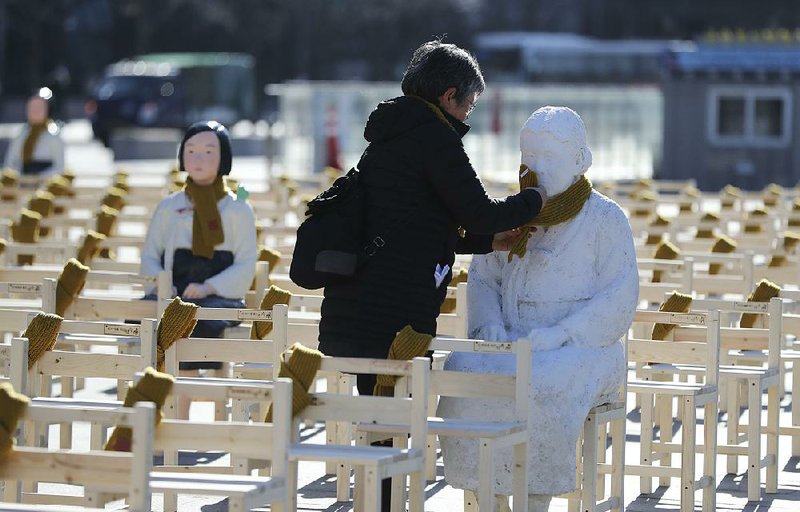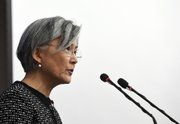SEOUL, South Korea -- A South Korean government-appointed panel on Wednesday faulted a "final and irreversible" deal struck with Japan in 2015 to resolve a decades-old dispute over Korean women who were forced into sexual slavery during World War II.
The panel's findings offer President Moon Jae-in a potential opportunity to change or even scrap the agreement reached between Japan and his predecessor as president, Park Geun-hye.
At a news conference Wednesday, Foreign Minister Kang Kyung-wha said her ministry "humbly" accepted the panel's conclusion that the government had failed to represent the victims' demands when negotiating the deal.
"As foreign minister, I bow my head deeply, expressing regrets for causing pains for the victims and their families, their advocacy groups and the people in general," Kang said.
Today, Moon put the future of the 2015 deal in doubt, calling it faulty in "procedure and content" in a statement he issued today.
Moon's statement called for a resolution "with a focus on the victims," taking into account the panel's findings. The statement didn't say whether Moon was scrapping the previous deal.
"Despite the burden that the agreement is an official promise between the two countries confirmed by the leaders, I have to make it clear again as the president and with my people that the issue of comfort women can't be resolved with this agreement," Moon wrote.
Japan reacted angrily to the panel's findings.
"If the South Korean government tries to change an agreement that is already being put into practice based on this report, relations between Japan and South Korea will become unmanageable," Japanese Foreign Minister Taro Kono said Wednesday in a statement. "This is absolutely unacceptable."
Though the 2015 agreement was applauded by the United States, it was widely criticized in South Korea.
In the deal, which both governments at the time called a "final and irreversible" settlement, Japan expressed responsibility and made a new apology to the victims, promising an $8.3 million fund to help provide care for the elderly. In return, South Korea promised not to criticize Tokyo on the issue again.
But some of the women complained that the deal had ignored their demands that Japan take "legal" responsibility and provide official reparations.
Kang said the government would not make a final decision until it had consulted again with the women and their families and considered the ramifications of changing or scrapping the deal for relations with Japan.
In Tokyo, Kono warned that any attempt to revise the agreement would be "unacceptable" and would make the relationship between Japan and South Korea "unmanageable."
"The Japan-South Korea agreement is an agreement between the two governments and one that has been highly appreciated by international society," Kono said Wednesday. Both countries are close U.S. allies.
Park, whose government engineered the 2015 deal, was impeached by the South Korean Parliament in December 2016 on charges of corruption and abuses of presidential power. She was formally deposed through a Constitutional Court ruling in March.
Her government's agreement on women forced into sexual slavery, euphemistically known as comfort women, has proved deeply unpopular at home. Some survivors have vehemently opposed it, as did a majority of South Koreans, according to recent surveys. During the presidential election campaign, Moon and the other candidates all said they would review the agreement if elected.
The legacy of sexual slavery remains one of the most intractable disputes resulting from Japan's colonization of Korea from 1910 to its World War II defeat in 1945.
Historians say at least tens of thousands of women, many of them Korean, were lured or coerced to work in brothels catering to the Japanese army from the early 1930s until 1945. The Korean women who survived the war lived mostly in silence because of the stigma, and many never married. A total of 238 women have come forward in South Korea since the early 1990s, of whom 36 are still alive.
Information for this article was contributed by Kanga Kong and Isabel Reynolds of Bloomberg News and by staff members of The Associated Press.
A Section on 12/28/2017



